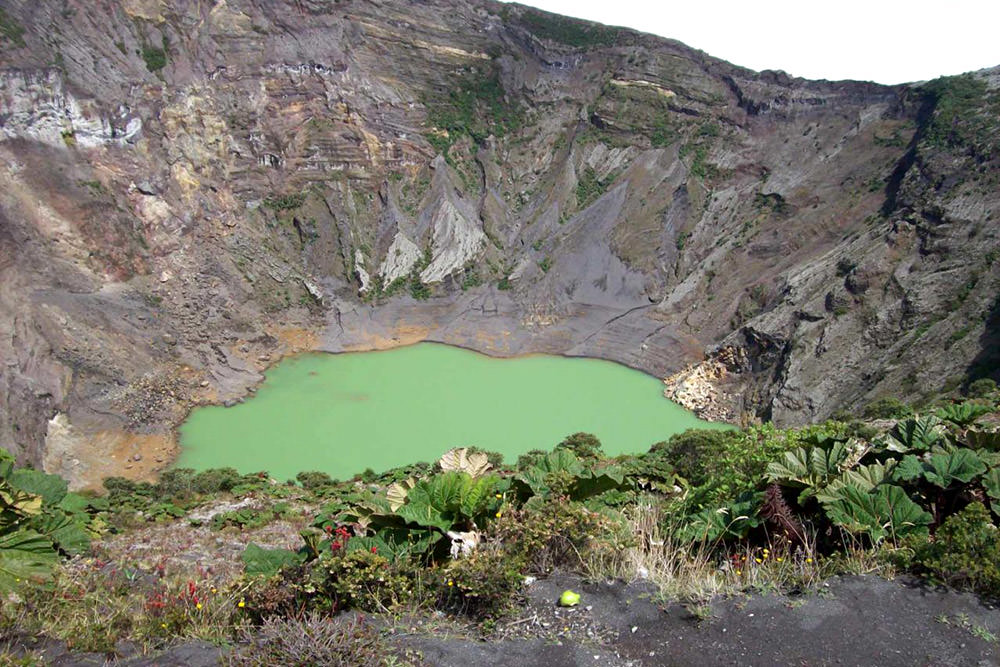
On the Central Volcanic Mountain Range, the massif Irazíº, 31 km northeast of the city of Carthage, of Canton Oreamuno, province of Cartago.
EXTENSION
It has an area of 2309 hectares.
IMPORTANCE
The Irazu Volcano is an asset with a long history of eruptions and eruptive cycles. It is an important area hydrology. In it, born several rivers that feed the river Chirripó Reventazon Rio, Rio Sarapiqui and Rio Grande de Tárcoles. The origin of its name from an Indian village that existed on the flanks of the volcano called Iztarú, that word meant to them and shaking thunder of the hill. However, through years of verbal communication by the name was changed to Irazu. It is one of the most visited areas of the system, both domestic and international tourism.
CURIOSITIES
His name is of indigenous origin, comes from the word meaning hill Istarú tremor and thunders. Over the years it changed to Irazu. Also known as “Santa Barbara Mortal of Nature”.
Its activity has been documented since the beginning of the Spanish colony (1563). The first historical account of an eruption dates from 1723, when the crater was the main responsible of the great eruption, causing many tremors. On August 9, 1962 resumed activity of the volcano in March 1963 but was given the status of national emergency. The eruptive activity continued until 1965. The huge volumes of ash from the Irazu, caused heavy losses to agriculture and livestock and affected the health of the inhabitants of the Central Valley. The Irazu eruptive events held in recent years, the last of which produced a flood that crept up the River Sucio, the Braulio Carrillo Highway.
By the fact that on a clear day you can see from its summit (west of the main crater rim), while the Pacific Ocean and the Atlantic, much of the national and terrirotio telescope to Lake Nicaragua.
Is the volcano is the highest in the country, with a height of 3432 m. Originally it was called the volcano of Cartago.
GEOLOGY
The Irazu is a shield volcano complex (500 km2) in a subset irregular, the temperature at the site ranges from -3 ° C to -17 ° C. It is a stratovolcano (distinct layers of volcanic material) of 3432 meters above sea level, features estrombolianas (with violent eruptions) and five distinct craters. The most important recent activity are the main crater nearly circular and highly inclined walls, measures 1050 meters in diameter and 300 meters deep, Crater Diego in The Hague of 600 meters in diameter and 100 meters deep. Other craters are: Playa Hermosa, La Laguna and pyroclastics. Today is also observed in the outer side of the main crater, an area known as fumaroles Meite where water vapor and gases.
WEATHER
The climate is classified as very wet, cold with a short dry season (December to April) and rainy (May to November). Often mornings are clear and cloud cover increases in the course of the day.
FLORA AND FAUNA
The vegetation in the highest part is characteristic of subalpine rain páramo zone of life that is at altitudes above 3,300 meters and up to 4,000 meters, typical of the Andean regions. Note that the only place in the Central Volcanic Range, which has this type of life zone, with species such as myrtle and arracachillo.
There are also almost pure forests of oak and oak tree bark tough, abundant in the Atlantic sector of the volcano. Are patches of primary vegetation, including living in the area of montane rainforest on the banks of rivers, northeast corner of the main crater, with species such as black oak, cage, sage, matagente, parrot, escalonia, candelilla, cow tongue umbrella and poor.
The diversity of animals is relatively low, its height, deforestation and volcanic activity. Among bird species such as rushes out volcanero the carpenter mask, the yigüirro, the goldfinch, the Brown Owl, the red climber, the zacatera the pitorreal and several species of hummingbirds. Some mammals can be observed that rabbit is the mountain, the coyote, armadillo, the porcupine, weasels, the Caucel the pizotes and red squirrel.
SERVICES
Paved road, parking, lookout, cafeteria, health services, information office, lunch area.

 English
English






